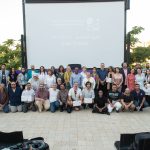
Amman’s Pitching Platforms Titles Catches the Range, Depth and Nuance of New Titles from Emerging Arab World Talent
July 6, 2025
18 Awards for 13 Projects at Amman Film Industry Days
July 8, 2025VERDICT: Amman International Film Festival – Awal Film (AIFF) raises the curtain on Arab and international films for the 6th time, during a pause in Mideast hostilities and the ongoing tragedy in Palestine.
The missiles and drones that lit up the night sky over Amman just weeks ago have halted, allowing Jordan’s young but popular Amman International Film Festival – Awal Film (AIFF) to unfold right on schedule from July 2 to 10. Though the red carpet and celebratory activities have been canceled out of respect for the continuing tragedy in Palestine, the festival is pressing on with its cultural mission undaunted.
In this regard, this year’s theme “A World Unscripted” is particularly apt. As the festival president and co-founder Princess Rym Ali puts it, it’s “a theme that echoes the region’s current moment marked by uncertainty, upheaval, but also connection and possibility.”
In her warmly applauded address at the opening ceremony, Princess Rym identified “A World Unscripted” as “quite simply the world we live in. A world that has gone off-script. But the filmmakers we have in our selection are the ones who contribute to bring it back on track.” She affirmed the festival’s role in providing a platform for stories that are often underrepresented, yet essential to the collective narrative of the Arab world, adding: “We refuse to allow our culture to die, even as engines of death and destruction fly above our heads.”
The other guiding force behind AIFF is its director and co-founder Nada Doumani. She got her start as a journalist in Switzerland (“a different life, a different me”). First as a newspaper reporter and then as a radio journalist, her job took her to the world’s hotspots: Iraq, Burundi, Kosovo, Sudan. When she came to Jordan to make a film on Iraqi exiles, it provided a natural transition into the world of film.
Regarding AIFF, “2020 was a terrible year to start a film festival”, Doumani admits. Originally scheduled to launch in April, which turned out to be the peak of the Coronavirus pandemic, the first edition was pushed to August 2020 when the situation was a mite better. There were still curfew restrictions at 10 p.m., which is prime festival time. But the main issue of how to screen films for live audiences was ingeniously solved, to the public’s general satisfaction, by showing festival films in a drive-in setting organized on three parking lots. Locals drove their own cars to the movies. There were no international guests that year, as the airport was closed.
Six years on, Jordan’s flagship film festival (there is also the Karama Human Rights Film Festival in December) continues to courageously take on challenges that would cow less seasoned organizers. Just weeks ago, Royal Jordanian Air Force jets were intercepting Iranian missiles and drones on their way to Israel, with air raid sirens warning the population they had the potential to fall within Jordanian airspace. Now Amman’s Queen Alia airport has reopened to commercial flights, though there is a visible drop in arriving passengers. Not surprisingly, the festival also experienced cancellations, but has held the line at a healthy 130 international attendees, a number Doumani finds very comfortable.
“The question was, is it decent to hold a festive event while all around us people are getting killed? Our reasoning is that the festival is a cultural event that promotes Arab cultural identity,” she told TFV, “which is exactly what is lost if events like this get canceled. These are our stories. These are the people who deserve our awards.”
As with all the other film events in the MENA region, war-torn Palestine casts a long shadow over normal festivities. The festival has canceled outer shows of pomp and glamour; ergo, no red carpet and no celebrations filled with music and dancing. Doumani, who attended one of the first Sarajevo film festivals held during the Bosnian war, notes a parallel with Amman’s support from its local population. “We Arabs support ourselves. Bombs may be killing people every day, but we shouldn’t let our culture die. If the airport had been closed this week, we would have done the festival anyway, for the people of Jordan.”
Among the 62 films being screened this year are six titles made on the ground in Gaza: The Mission, a harrowing story of surgeons working under horrific conditions in Gaza, and the new compilation film From Ground Zero +. A special selection of Irish classics fetes Ireland as this year’s Country of Honor, well-represented by the commanding figure of director Jim Sheridan. Prizes for Arab Narrative Films and Arab Documentaries will for the first time be joined by awards for a Non-Arab Films category, and an Industry section has been added.



